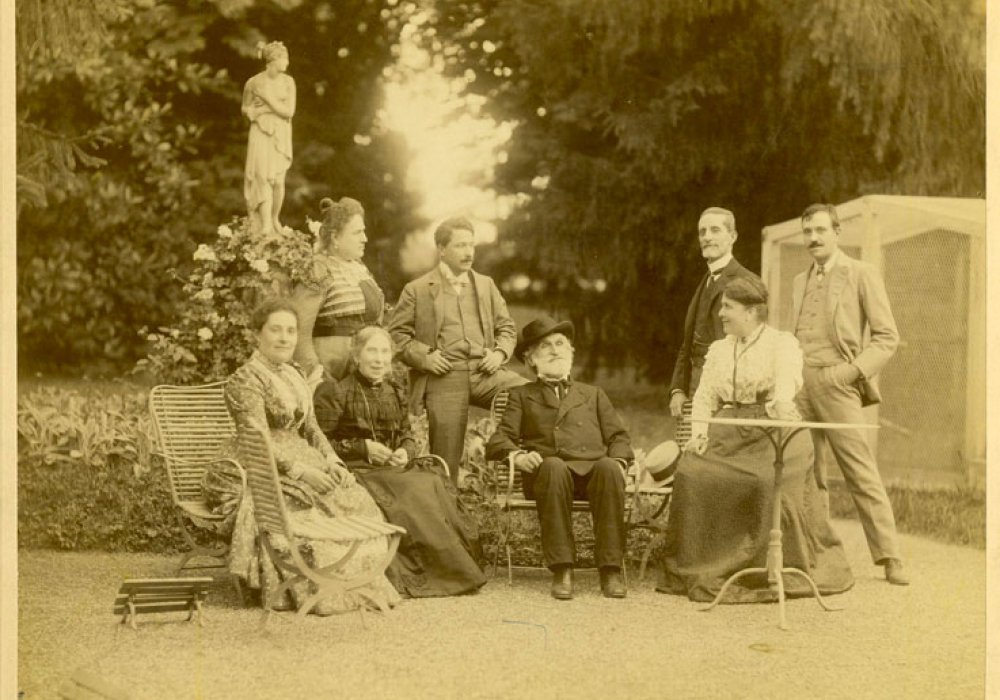Giuseppe Verdi - Genius and Patriot

Giuseppe Verdi was born in Roncole, a hamlet in the town of Busseto (which at the time was part of the Duchy of Parma and Piacenza under the First French Empire domination), on 10 October 1813 from a humble family. His father Carlo (1785–1867) worked as a grocery store/ innkeeper and his mother Luigia Uttini (1787–1851) was a seamstress. Father Carlo was the son of small landowners and farmers originally from the area of Piacenza who was able to save some money and open an “osteria”, i.e. an inn on the ground floor of his home in Roncole.
The baptismal register, on 11 October lists him as being "born yesterday", but since days were often considered to begin at sunset, this could have meant either 9 or 10 October. The next day, he was baptized in the Roman Catholic Church in Latin as Joseph Fortuninus Franciscus. The day after that (Tuesday), Verdi's father took his newborn the three miles to Busseto, where the baby was recorded as Joseph Fortunin Francois; the clerk wrote in French. "So it happened that for the civil and temporal world Verdi was born a Frenchman."
Despite his humble origins Giuseppe was able to pursue his musical vocation since a very early age; the organist of the local church of Roncole, Mr. Pietro Baistrocchi was the first one to give him free music lessons followed by Mr. Antonio Barezzi a local merchant and the director of the local Philharmonic Society who financed his further studies. A 19-year old Giuseppe Verdi applied to the Conservatory in Milano but ironically he did not pass the admission exam (today that same Conservatory is named after him). He took lessons at the Theatre of La Scala instead with the cembalist Vincenzo Lavigna who taught him the principles of music composition until 1836 when he was awarded the position of music teacher for the town of Busseto.
Because he loved Verdi’s music, Barezzi invited Verdi to be his daughter Margherita's music teacher, and the two fell deeply in love. They were married on 4 May 1836 and Margherita gave birth to two children, Virginia Maria Luigia (26 March 1837 - 12 August 1838) and Icilio Romano (11 July 1838 - 22 October 1839).
The production by Milan's La Scala of his first opera, Oberto Conte di San Bonifacio in November 1839 achieved a degree of success, after which Bartolomeo Merelli, La Scala's impresario, offered Verdi a contract for two more works. It was while he was working on his second opera, Un giorno di regno, that Verdi's wife also died. The opera, given in September 1840, was a flop and he fell into despair and vowed to give up musical composition forever. However, Merelli persuaded him to write Nabucco and its opening performance in March 1842 made Verdi famous.
Legend reports that, when the Va, pensiero chorus was sung in the third act of Nabucco in Milan, then belonging to the large part of Italy under Austrian domination, the audience, responding with nationalistic fervor to the exiled slaves' lament for their lost homeland, demanded an encore of the piece. As encores were expressly forbidden by the government at the time, such a gesture would have been extremely significant. After Italy was unified in 1861, many of Verdi's early operas were re-interpreted as Risorgimento works with hidden Revolutionary messages. Beginning in Naples in 1859 and spreading throughout Italy, the slogan "Viva VERDI" was used as an acronym for Viva Vittorio Emanuele Re D'Italia (Victor Emmanuel King of Italy), referring to Victor Emmanuel II, then king of Sardinia.
By then Verdi had already met Giuseppina Strepponi, a soprano in the twilight of her career whom he married on 29 August 1859 at Collonges-sous-Salève, near Geneva. In 1848, while living in Busseto with her, Verdi bought an estate two miles from the town. Initially, his parents lived there, but, after his mother's death in 1851, he made the Villa Verdi at Sant'Agata in Villanova sull'Arda his home until his death (in the photo).
Among the masterpieces that Verdi created during his life are: Rigoletto, Il Trovatore, La Traviata and Aida to name just a few. His operas are among those most frequently produced in the world today.
Giuseppe Verdi died on 27 January 1901 in Milan. First, he was buried next to his second wife in Milan's Cimitero Monumentale; a month later, amid national mourning, their bodies were moved to the Casa di Riposo, the foundation for retired musicians in Milan, founded by Verdi. Before the procession left the cemetery, Arturo Toscanini conducted a large choir composed of musicians from all over Italy which sang Va, pensiero. To date, it remains the largest public assembly of any event in the history of Italy.
© 2016 MY ITALIAN FAMILY, LLC. All rights reserved
